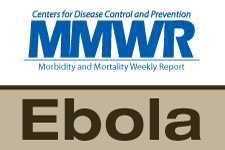Questions and Answers about Ebola and Food Safety in the United States
On This Page
Below are questions and answers about Ebola and how it relates to food safety in the United States.
Q&As for Consumers
Can I get Ebola from eating food?
- Ebola virus is not spread by consuming food, with the possible exception of bushmeat [PDF – 1 page] in (or from) Africa. Bushmeat is meat from wild animals, such as bats and monkeys, hunted for food in developing regions of the world such as some African countries.
- No one has been infected with Ebola from foods that were imported, or even illegally smuggled, into the United States.
- No one has been infected with Ebola from eating foods that are grown or purchased in the United States.
- There is no evidence that foods produced commercially have ever transmitted Ebola virus anywhere in the world.
- There has been no evidence in previous Ebola outbreak investigations of the virus spreading through food contaminated with the blood or body fluids of an infected food worker.
Can I get Ebola from handling or eating African bushmeat in the United States?
- In some African countries, past Ebola outbreaks were associated with exposure to contaminated bushmeat, although the way Ebola was spread (butchering, handling, or eating) from bushmeat to people is unknown.
- Hunting, butchering, and eating wild animals in the United States poses no risk of Ebola virus infection.
- It is illegal to bring bushmeat into the United States.
- Bushmeat brought into the United States from Africa could make people sick if it contains Ebola virus, although this has never occurred.
- Bushmeat found at United States ports of entry is confiscated and destroyed along with all items that may have come in contact with the bushmeat.
- Up to $250,000 in fines may be imposed for smuggling bushmeat into the United States.
- If you encounter bushmeat in the United States, do not eat it or handle it, and report it to the health department.
Does food imported from a country with an Ebola outbreak pose a risk to United States consumers?
- Transmission of Ebola through eating or handling food other than bushmeat has never been documented. Foods (other than bushmeat) imported from a country with an Ebola outbreak should pose no risk of Ebola to consumers in the United States.
- Additionally, the United States Department of Agriculture (USDA) has import regulations that are intended to protect the livestock population of the United States.
- USDA regulations prohibit the entry of live animals including cattle, sheep, goats, and pigs, and animal products, meat and poultry unless they were treated to mitigate the risk of diseases from most countries in Africa.
Q&As for the Food Industry
Can sick food workers spread Ebola through food?
- If an ill food worker has not had contact with anyone with Ebola, he or she does not have Ebola and cannot give anyone Ebola.
- There is no evidence in previous Ebola outbreak investigations of the virus spreading through food handled by an infected food worker. However, any food worker with fever or illness symptoms such as coughing, vomiting, or diarrhea should not handle food.
- Contact your health department immediately if a food worker develops signs or symptoms of Ebola after returning from a country where there is an Ebola outbreak, or has had contact with someone who has Ebola.
If someone with Ebola sneezes or coughs on a food item, can this person spread Ebola?
- There is no evidence that Ebola virus is spread by coughing or sneezing.
- Ebola virus is transmitted through direct contact with infected blood or body fluids (including but not limited to urine, saliva, sweat, feces, vomit, breast milk, and semen).
- Ebola virus is not transmitted through the air. However, droplets (e.g., splashes or sprays) of respiratory or other secretions from a person who is very sick with Ebola could make others sick.
- Food that is known to be contaminated in any way, such as by a sneeze by someone with a cold, should always be thrown away and should not be sold or served for human consumption.
How do I clean and disinfect an area that may be contaminated with Ebola?
- Do not attempt to clean an area that may be contaminated with Ebola virus.
- Call your health department immediately and stay away from the possibly contaminated surface area. People trained, and equipped with the proper personal protective equipment (PPE), to clean vomit or other body fluids that could be contaminated with Ebola will be able to safely clean and disinfect the area.
What steps need to be taken if I find out that a customer who visited my establishment has been diagnosed with Ebola?
- Contact your health department to discuss the best course of action.
- The risk of other employees or customers contracting Ebola would be extremely low unless people came into direct contact with the blood or body fluids of a person who was sick with Ebola.
Related Links
- Questions and Answers about Ebola
- NIOSH Fact Sheet: Ebola Questions and Answers for Airport Retail and Food Service Workers [PDF – 1 page]
- United States Food and Drug Administration Food Code
- United States Department of Agriculture Food Safety and Inspection Service
- WHO Ebola and Food Safety
- OSHA Cleaning and Decontamination of Ebola on Surfaces Guidance
- Page last reviewed: January 8, 2016
- Page last updated: January 8, 2016
- Content source:




 ShareCompartir
ShareCompartir